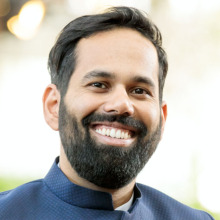iSchool Researchers Awarded $882K Grant to Study the Impact of Artificial Intelligence on Teamwork

Image by Lucija, courtesy Adobe Stock. Generated with AI.
What are the key processes that govern teamwork in hybrid human-artificial intelligence (AI) teams? And what capabilities should an autonomous AI agent have to be an effective teammate to its human partners?
These are the questions a team of University of Arizona School of Information (iSchool), Department of Computer Science and Norton School of Human Ecology researchers will explore through a two-year grant of more than $882,000 made by the U.S. Army Combat Capabilities Development Command Army Research Laboratory in December 2023.

Adarsh Pyarelal, Assistant Professor.
The Next Generation Teams project will conduct experiments to study the structured communication protocols that exist on workplace and other teams that use AI agents, the interventions AI agents use to correct deviations from those protocols, and the effects of AI on team performance, coordination, creativity and plan recognition, says Adarsh Pyarelal, an iSchool assistant professor and the project’s principal investigator.
According to Microsoft, AI agents are computer programs or systems designed with the capability to perceive their environment, make decisions and take actions to achieve specific goals. They operate autonomously—without direct human control—and are used in such applications as chatbots, smart home devices, programmatic trading in finance and, more and more, project management and other team-based, interactive systems.
The Next Generation Teams project will undertake four fundamental research efforts:
- Detecting communication breakdowns in teams by developing and evaluating algorithms through new experiments involving human-AI teaming.
- Modeling team coordination with a particular focus on “shared latent constructs that explain and predict team interactions.”
- AI plan recognition via algorithms guided by natural language understanding.
- Understanding team creativity by developing models for detecting creativity at both the individual and team levels and then studying the relationships between closed-loop communication, creativity and team performance.
The overarching goal of the UArizona team is to “significantly advance our understanding of key processes that govern team effectiveness,” Pyarelal says.
The team, which in addition to Pyarelal is comprised of iSchool Associate Professor Clayton Morrison, iSchool Professor Winslow Burleson, Computer Science Professor Kobus Barnard and Human Development and Family Science Assistant Professor of Practice Payal Khosla, will also develop open-source software systems and share its data with the public “in order to advance the state of the art in human-machine teaming research,” Pyarelal says.
Learn more about the dynamic, interdisciplinary research of the School of Information. Or explore possibilities for supporting faculty and research at the iSchool.

